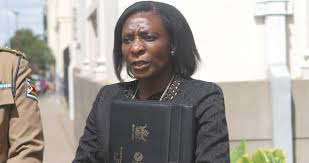Wisdom Mumera
The current electoral laws still have loopholes allowing for voting using the old voter’s roll and there is a need to quickly amend the Electoral Act to avoid confusion, the Election Resource Centre (ERC) has said.
According to the organisation the Electoral Act is vague on the issue of the old voter’s roll after the compilation of a new voter’s roll to be compiled using biometric process.
“Firstly, the Electoral Act, as it currently stands, does not definitively establish a fresh registration process which will ultimately vanquish the 2013 voters’ roll and thus barring voting on the basis of being registered on the old voters’ rollsays.
“Section 36A of the Electoral Act needs to be amended to effectively bring forth a fresh registration process without leaving a back door open for old registrants who may fail to register through the proposed biometric process, to claim their vote on the basis of the old roll”.
” While the recently gazetted Statutory Instrument 85 (S.I. 85) of 2017, which outlined voter registration regulations, obligates the Zimbabwe Electoral Commission (ZEC) Chief Elections Officer to authenticate or certify the subsequent voters’ roll following closure of the register for a given electoral event, the regulations are not explicit as to what happens with the pre-existing 2013 voters’ roll”, it says.
According to ERC the new voter registration regulations fails to address growing fears on possible use of the 2013 voters’ roll, by omitting the fate of the pre-existing 2013 voters’ roll.
This it says could have clarified provisions of Section 36A of the Electoral Act which requires ZEC to take a position about the pre-existing voters’ roll.
“Secondly the Election Resource Centre (ERC) has already witnessed ZEC conduct by-elections on the basis of a main voters’ roll which was being compiled through mobile voter registration and a supplementary voters’ roll which is the 2013 roll less people who will have registered afresh”.
” Such a precedence is dangerous come 2018 as, without strengthening the legal framework of our elections, we may have two rolls applying for the polls. Sadly, the use of two voters’ rolls alone, make our elections difficult to verify as is prescribed by the Constitution of Zimbabwe”, it added.
The ruling ZANU PF has consistently refused to budge and implement electoral as the evening out of the field has hypothetically appeared to give advantage to the opposition parties.
Efforts by the MDC,PDP and others under the NERA banner to push for electoral reforms have so far failed to yield anything.
Prof Jonathan Moyo,the Minister of Higher Education is actually on record stating that they won’t institute any reforms as the move is equal to reforming themselves out of power.
The ERC says one narrative that has prompted the initiative to lay bare the dangers of non-exhaustively burying the 2013 voters’ roll is the narrative of the possibility of an early election.
“The state media has proposed, through statements attributed to a senior Zimbabwe African National Union Patriotic Front (ZANU PF) official, that there is scope for the President to call for an early election. While Zimbabwe’s next harmonised elections are constitutionally scheduled for between end of July and end of August 2018, it is conceivable that a ruling party, enjoying a Parliamentary majority, could entertain the option of stampeding the nation into an early poll, if doing so strategically gives the incumbent an edge over opponents.”
“Considering the capacity of the ruling party to execute the “threat” of an early election, it would make sense to attempt to influence other variables associated with such a scenario such as the voters’ roll which will be used, the rules of the election and the state of the election administrative infrastructure.”
” The effort to scuttle attempts at a stampeded election must be accompanied by a very loud demand for the timely and necessary reforms to guarantee credibility of electoral processes”, it says
The consequences of failing to cremate the 2013 voters’ roll ahead of the 2018 election include the fact that stakeholders would have to content with a document that has been kept away from public scrutiny for years.
Using such a document either as a primary document or even a secondary one would dent the credibility of the 2018 election. Public confidence that the election would not be predetermined would be greatly undermined according to the experts.
“Another consequence that would accrue if the 2013 voters’ roll was to resurrect ahead of 2018 is that the verifiability of the election results would be difficult to sustain. Zimbabwe’s previous voters’ rolls have contained some discrepancies which cannot be wished away through some ceremonial cleansing process. The demon associated with the old voters’ roll can only be cast by total annihilation of any trace that the roll ever existed.”
The ERC says an emphasis of advocacy for a strengthened legal framework will, if successful, form the foundation for sound election processes since doing all else right while the foundation of the elections remains weak will only result in a total collapse of that which is being built.
“The ERC calls upon election authorities to direct effort towards ensuring a strengthened ZEC that has a relationship with the public, and administers electoral processes independently. The environment in which electoral processes are conducted is the last frontier that must remain free from violence and intimidation.”
It said the clarion call going forward must thus be that a credible voter registration process to replace the 2013 voters’ roll is a must and any call for an early election must be informed by the finalisation of a clean voters’ roll that has been availed to stakeholders in time for independent audits of it to be concluded and final copies made public.
